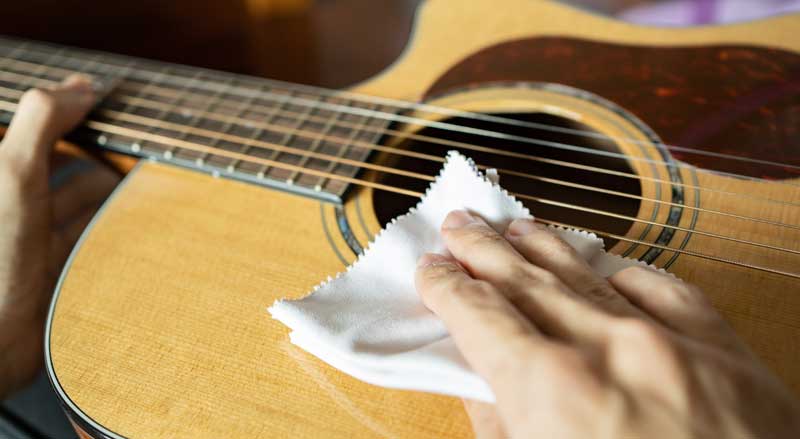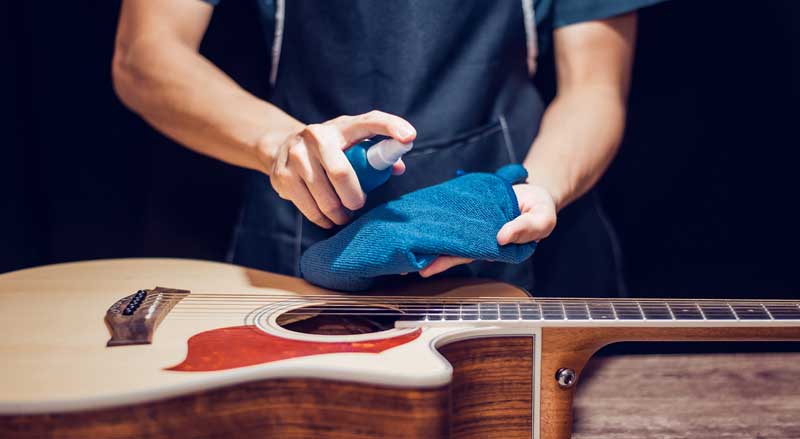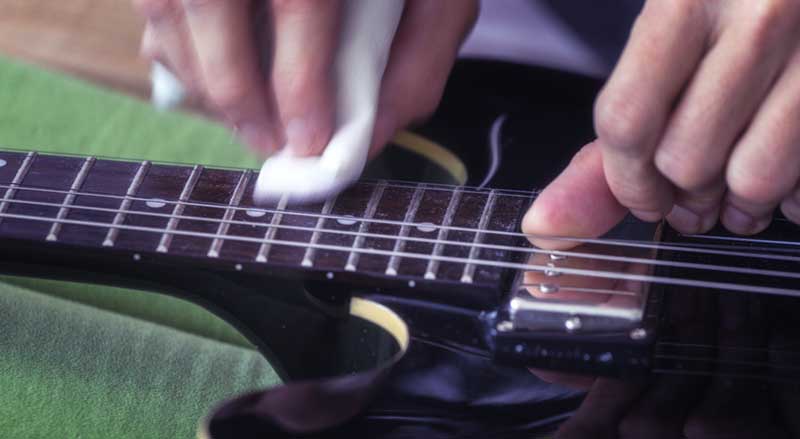
- bnaturalPianoAdmin
Whether you play your guitar daily, or like to see it on display, it’s important to keep your guitar clean so it will sound and look its best. Here we explain how guitars get dirty and 5 tips for cleaning and polishing your guitar.
How Guitars Get Dirty
The beautiful music guitars make requires a human touch. And this means that a cherished guitar will collect a fair amount of dirt and grime.

Guitars will get dirty when they’re:
- Touched by oily skin
- Handled with sweaty hands
- Played outdoors or in a smoky room
The best way to make sure that your guitar stays as clean as possible is to wash your hands before playing. This small step will go a long way toward keeping your guitar clean.
Keeping your guitar stored in its case will also help protect it against dust and changes in humidity. But if you enjoy keeping your guitar on display, get in the habit of wiping it down with a microfiber cloth when you see dust accumulating.
Why Worry About Cleaning?
A properly cleaned guitar will not only look newer—it will sound better. And it will even feel better to the touch when you’re playing it.
The way your guitar looks can also affect your public image. Some performers want their guitar to have a clean, new look. Other musicians want their guitars to have a much-used, rather lived-in look.
However, if you ever decide to sell or upgrade your guitar, it will probably command a better price if it produces great sound and if it looks well-maintained.
Guitar experts recommend that a guitar gets a full-service cleaning once or twice a year.
Ready to clean your guitar? Following are 5 great tips for cleaning both acoustic and electric guitars.
Prepare Your Work Area
Start by selecting a well-lit work area. This will allow you to see dirt, smudges, and fingerprints on the guitar.
Place your guitar on a clean and secure surface. You want the guitar to remain protected and steady while you work.
When you are busy cleaning your guitar, it will move around. Any dirt on your work area can end up scratching your guitar’s finish. So, make sure the work area is clean and place the guitar on a clean, smooth towel or mat.
The best solution is to purchase a mat that has a neck cradle and is specifically designed for this purpose. The neck cradle will protect the guitar’s neck if you need to apply slight pressure to clean the frets and fingerboard.
Use A Smooth Lint-Free Cloth

Use a smooth lint-free cloth to wipe down your guitar — including the strings, neck, bridge and body of the guitar. This cloth will effectively remove grime, oil, fingerprints, and smudges.
Microfiber polishing cloths are soft and well suited for this job. However, avoid the knobby microfiber dusting cloths. They can scratch the finish of your guitar.
Other gentle cleaning cloths are:
- Lens-cleaning cloths
- Chamois cloths
Some guitar experts like to use a wrung-out, damp cloth instead. They then follow up with a soft, dry cloth to absorb any remaining moisture.
If, after using a cloth, built-up dirt and grime remain, you should move on to using a cleaner and polish.
Carefully Select Guitar Cleaners and Polishes
It’s important to only use a cleaner or polish that’s compatible with your guitar’s finish.
Nitro-finished guitars have extremely fragile finishes, more so than guitars with poly-based finishes. Be especially careful with these types of guitars.
Also, before selecting a cleaner or polish, determine if your guitar has a satin or gloss finish, and purchase the one that’s right for your guitar.
If you need guidance, a knowledgeable music store that sells guitars will advise you as to the type of finish your guitar has and which cleanser and polisher to use.
Cleaning
In many cases, a soft damp cotton cloth, followed by a dry cloth will do a nice job. When it comes to removing stubborn dirt and grime, guitar cleaners can be very helpful.
Never use any of the following products for cleaning as they can cause permanent damage to your guitar’s finish:
- Glass cleaners
- Any product containing ammonia
- Any product containing abrasives
- Any product containing silicon
Polishing
Guitar polishers will smooth out surface scratches and give your guitar a glossier look.
Some guitar polishers fill, or partially fill superficial scratches in certain guitar finishes. You then need to buff the guitar to create a superb shine.
Don’t polish if:
- You want your guitar to have a rugged finish
- Your guitar’s surface has cracks or other defects.
Use This Method to Apply Cleaner and Polish

Never spray the cleaner or polish directly onto your guitar. Instead, put a small amount on a smooth cloth and work it into a small area on your guitar, using a circular motion.
Then, wipe it off as you buff your guitar using a soft, clean, dry cloth. When one section is finished, move on to the next.
Avoid getting the product:
- On any raw wood or in the sound hole
- In joints where the neck connects to the body
- Along the edges of the pickguard
If you slip up and see polish in these areas, cover a toothpick with a soft cloth and gently clean out the polish.
Clean Your Strings Often

After each session of playing your guitar, wipe down the strings with a smooth microfiber cloth. You can also apply a liquid string cleaner from time to time.
Removing sweat and moisture from strings will make them less likely to break and will help them last longer.
You’re never too busy or old to learn to play a musical instrument. Contact us at B Natural Pianos for instrument and voice lessons, or to buy, rent, or repair a musical instrument.



